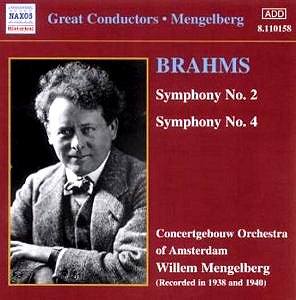Judging by some CD remasterings which I've heard previously
(including a wonderful account of the Beethoven Violin Concerto by Georg
Kulenkampff on Dutton CDEA 5018) the Telefunken engineers were producing
some recordings in the late 1930s and early 1940s which were pretty
remarkable in terms of sound quality.
This Naxos issue which contains two Brahms symphonies
recorded under Willem Mengelberg (1871-1951) in the marvellous acoustics
of the Concertgebouw confirms this impression. In sonic terms these
recordings are very good indeed even though there are some blemishes
which betray the age of the masters. Most noticeably, there is some
congestion in loud tutti passages and in an accompanying note the producer,
Ward Marston, discusses frankly some of the problems he faced in transferring
these performances to CD. However, to my ears it seems that both the
original engineers and Marston himself have done a remarkable job in
reproducing the sound of Mengelberg's great orchestra playing in the
wonderful, mellow hall from which the orchestra takes its name. One
soon forgets sonic limitations and focuses on the performances themselves.
And what performances they are! Ian Julier, the author
of the very good liner notes, is clearly an enthusiast and he describes
the performances as "characteristically athletic and powerfully
wrought."
By common consent the Second Symphony is Brahms sunniest
essay in the genre. Mengelberg does not underplay the lyrical aspect
but equally he does not linger excessively. His is an urgent, sinewy
reading though it is not as fleet as Toscanini's electrifying 1952 live
account with the Philharmonia (now officially available, thanks to Testament,
and essential listening). Mengelberg's performance is founded securely
on the marvellous Concertgebouw strings (from the singing violins down
to the sonorous basses). This is not to devalue the importance of the
wind or brass choirs, both of which make telling contributions. Mengelberg
and his players command attention from first note to last. This is a
bracing and electric performance which culminates in a suitably exultant
coda to the finale.
The performance of the Fourth Symphony was set down
some 18 months earlier. As Ward Marston points out there is less space
round the music because the Telefunken engineers adopted closer microphone
placings on this occasion. Though one notices the difference between
the two recordings I must say I didn't find the comparative closeness
a great problem in the Fourth. Certainly there is none of the boxiness
which one often encounters in EMI Abbey Road recordings of this vintage.
Actually, the closer microphone placings bring some gains in that additional
inner detail is caught in this recording.
As in the Second Symphony, Mengelbergs reading of the
Fourth is full of drive and energy. Once again, however, this is not
at the expense of the lyrical side of the music. The eloquent results
here achieved bespeak a long partnership between conductor and orchestra
(Mengelberg had been in charge of the orchestra since 1895) and also
a rigorous and disciplined preparation of the music by all concerned.
This traversal of the Fourth symphony is gripping and involving and
it is capped by a superb, fiery account of the great passacaglia finale
which truly conveys Brahms' marking of energico e passionato.
My CD collection already contains many fine recordings
of the Brahms symphonies but this disc is a distinguished addition to
their ranks. At the Naxos price its an outrageous bargain. Naxos deserve
the highest praise for making available important performances from
the past such as these at a price which will not only be attractive
to seasoned collectors of historic recordings but which should encourage
others to dip their toes in the water: they will not regret doing so.
The notes imply that further Mengelberg issues are to follow in this
series. I look forward to them and hope in particular that the other
two Brahms symphonies may be among them.
John Quinn
See also review by
John Phillips


